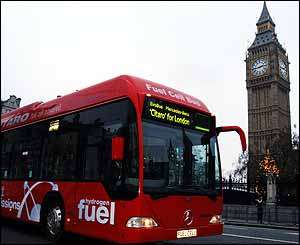A London Program Teaches Inner-City Kids Reading, Writing, and Reformation
"The From Boyhood to Manhood Foundation takes in dropouts and delinquents that other schools can't reach." (CS Monitor)

The Mayor of London announced Tuesday that ten new red double-decker hydrogen powered buses will join London's bus fleet by 2010 to reduce air pollution and CO2 emissions in the congested UK capital. The hydrogen fuel cell-powered vehicles will produce no pollution or carbon dioxide, and, as an added benefit, drastically cut noise levels.
"Hydrogen is a fuel of the future as it improves air quality and does not produce the harmful emissions which are causing catastrophic climate change, the mayor, Ken Livingstone, said. "London is now the first city in Europe to commit to a hydrogen bus fleet of this size, which will match traditional diesel buses in terms of performance. This represents a huge step forward from the previous hydrogen trials in the capital and is an important step towards my target of having five per cent of all public sector fleet vehicles powered by hydrogen by 2015."
In February 2006, the Mayor announced the London Hydrogen Transport program, which aims to introduce 70 new hydrogen vehicles into London – ten of these vehicles will be buses. Transport is responsible for 22 per cent of London's emissions, and the Mayor's Climate Change Action plan sets a target for annual reductions. Hydrogen vehicles are clean and efficient, and it is expected that the ten hydrogen hybrid buses will produce substantially fewer emissions of CO2 and other harmful air pollutants than a conventional diesel bus.
In one of the world's first commercial contracts for hydrogen buses, Transport for London has contracted with ISE – an American company for five hydrogen fuel cell buses and five hydrogen internal combustion engine buses. The contract with ISE is for £9.65 million and covers not only the initial cost of the vehicles themselves but also the specialist maintenance and replacement parts over a five year period after delivery.
Malcolm Wicks, Minister of State for Energy: "This is a very exciting development and a serious step towards the long-term aim of reducing emissions from road transport. The Government has backed the Mayor's scheme with £2.6m as part of a wider package of support for UK hydrogen and fuel cell projects. This again underlines our commitment to do what we can to tackle climate change."
Mike Weston, Operations Director for London Buses, said: "The Mayor and Transport for London are committed to tackling climate change through cutting London's contribution to CO2 and other emissions. Hydrogen technology is still being developed and we are paying a premium for these early models. However, we firmly believe this is a worthwhile investment in developing clean, green technology, and we expect costs to reduce over time."
This project compliments the activities of the Hydrogen Bus Alliance , which TfL was integral in setting up. The Alliance comprises representatives from the public transport authorities of international cities and regions that have demonstrated a clear commitment to hydrogen technology. Each member of the Alliance has made a commitment to buy at least five new hydrogen buses to begin operating between 2008 and 2012.
These ten new hydrogen buses are part of the Mayor's plan to have up to 70 hydrogen vehicles in operation in London by 2010, as set out in the London Hydrogen Partnership's Transport Action Plan.
Be the first to comment